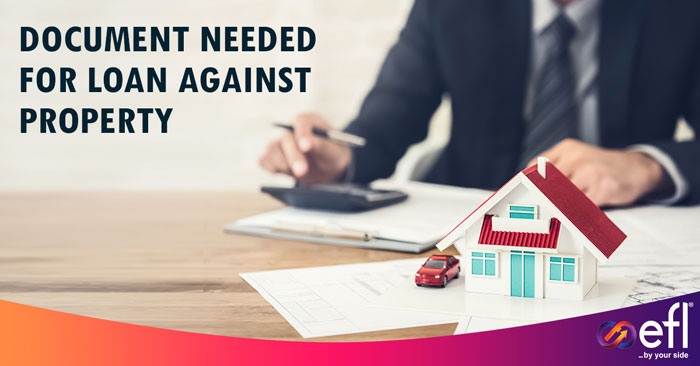Nowadays, if one is crunched for money, there are many options available such as unsecured loans – personal loan – and secured loans – business loan against property. Both these loans allow the spender a great deal of freedom to carry out their personal duties. However, a loan against property has a few advantages that a personal loan does not.
Business Loan against property is a loan wherein you put your property as collateral. The lender will then sanction a loan amount based on certain criteria such as whether the property is occupied or vacant, residential or commercial, etc. Certain agencies such as Electronica Finance Limited offer a maximum loan amount of Rs. 3cr, which is more than one would receive with an unsecured personal loan.
By keeping a property as collateral, the lender enjoys lesser risk since any issues can be solved by making a legal claim on the property. This added security is the main reason lenders can afford to offer you a lower business loan against property interest rate. One of the key advantages of this loan is that lenders offer longer repayment terms. This is incredibly beneficial for the borrower in case of a higher loan amount.
The long tenure along with lower business loan against property interest rate makes this loan an attractive choice.
Applying for this loan is relatively easy as long as one has all the necessary documents.
Documents Required for a Business Loan Against Property
Common Documents for Salaried and Self-employed Applicants
1. Proof of Identity
For all applicants, a valid identity proof is a fundamental requirement. This typically includes documents such as Aadhar card, passport, or driver’s license.
2. Proof of Address
Proof of residence is equally vital. Accepted documents usually consist of Voter ID, Utility Bills, or Rent Agreements.
3. Property Documents
Given the nature of this loan, property-related documents are crucial. Be ready to provide a list of documents, such as the sale deed, property tax receipts, or possession letter.
4. Bank Statements
Bank statements serve as a financial snapshot. Having your bank statements for the last six months will play a crucial role in the application process.
5. Passport-sized Photographs
Do not forget your passport-sized photographs. They are essential for processing your loan application form.
List of BLAP Documents for Salaried Applicants
1. Salary Slips
Salary slips for the previous 6 months showing all deduction.
2. Form 16
Form 16 is another critical document for those employed. It offers an insight into your tax deductions and annual earnings. Form 16 for the previous 2 years.
3. Income Tax Returns (ITR)
For salaried individuals, ITR documents are necessary. Ensure that you have filed your taxes and keep your ITR records up to date.
4. Address Proof
Proof of residence such as ration card, telephone bill, electricity bill, etc.
5. ID Proof
Proof of identity such as voter’s card or employee card.
Copies of all the property documents of the concerned property.
List of Documents for Business Loan Against Property for Self-employed Applicants
Self-employed individuals need to provide additional documentation to verify their income and business operations. These documents include:
1. Business Proof
Establish the legitimacy of your business with documents like the Business Registration Certificate or Trade License. Certified Financial Statement for the previous 3 years
2. Business Financial Statements
Your business financial statements, such as the Profit & Loss Statement and Balance Sheet, showcase your financial health. Provide the most recent bank passbook or account statement demonstrating a record of income deposits for the past six months.
3. Income Tax Returns (ITR)
As with salaried applicants, self-employed individuals need to keep their ITR records current to demonstrate their financial stability.
4. GST Certificate
If applicable, a Goods and Services Tax (GST) certificate is vital for those in businesses registered under GST.
5. CA Certified Profit and Loss Statement
A Certified Profit and Loss Statement prepared by a Chartered Accountant adds credibility to your financial documentation.
6. Address Proof
Proof of residence such as ration card, telephone bill, electricity bill, etc.
7. ID Proof
Proof of identity such as voter’s card or employer’s card.
Copies of all the property documents of the concerned.
business loan against property eligibility increases if the borrower has a bureau score of more than 600, business vintage more than 3 years, and turnover of more than Rs. 1cr.
Electronica Finance Limited’s business loan against property offers borrowers:
- Maximum loan amount of Rs. 3cr.
- Repayment period up to 84 months.
- Loan sanctioned up to 70% of the property valuation.
- Industrial property accepted as collateral.
Applying for a Business Loan Against Property without ITR filing
For self-employed individuals who haven’t filed Income Tax Returns (ITR), there are some challenges to overcome. It’s important to understand that the absence of ITR documentation can raise questions about your financial stability. However, there are potential solutions:
While not filing ITR can be a hurdle, you can still demonstrate your financial stability through other means. Proper documentation and well-maintained financial records become far more important in such cases. They can compensate for the lack of ITR documents.
Work with a financial advisor to explore alternatives, such as providing bank statements, business financial statements, and CA-certified financial documents.
Conclusion
In conclusion, understanding the documentation requirements for a business loan against property is crucial to a successful application. Ensuring that you have all the necessary documents in order is the first step in securing your loan. So, whether you are a salaried individual or a self-employed entrepreneur, following the guidelines and gathering the required documents meticulously will increase your chances of loan approval.
Remember, Electronica Finance Limited is here to help you navigate this process. With our 30+ years of experience, transparent application process, and unwavering commitment to providing customised financial solutions, we are your trusted partner in achieving your financial goals.
Prepare your documents, apply with confidence, and embark on a journey to fulfil your financial aspirations with a loan against property from Electronica Finance Limited.
Visit Electronica Finance Limited for more information and expert assistance on your loan against property needs.
FAQs
What is a business loan against property, and how does it work?
A business loan against property is a type of secured loan where you use your property as collateral to borrow money. The lender evaluates the value of your property and offers a loan based on it. If the borrower fails to repay, the lender can possess the property.
Can I get a business loan against property without income proof?
While having income proof, such as ITR and bank statements, is generally necessary, some lenders offer alternatives for self-employed individuals, like CA-certified financial statements and business financial documents.
What are the essential property loan documents for a business loan against property?
Key property documents include the sale deed, property tax receipts, and possession letter. These documents establish property ownership and its legal status.
How important is it to file Income Tax Returns (ITR) for a business loan against property?
Filing ITR is vital, especially for self-employed applicants. It serves as a primary document to assess your income and financial stability. Salaried individuals should also keep their ITR records updated since they could also use those for an BLAP.
What happens if I don’t provide proper documentation for a business loan against property?
Inadequate documentation can lead to loan rejection. Lenders rely on these documents to evaluate your eligibility criteria and financial stability. Ensure you have all required documents in order.
What is the role of a Chartered Accountant (CA) in a business loan against property application?
A CA can certify your financial statements, adding credibility to your self-employment income proof. CA-certified documents are essential for demonstrating your financial stability.




